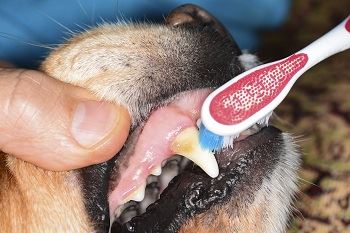Poor dental health is one of the most common ailments encountered in dogs and cats, yet we often don’t realize that a bit of bad breath can be more than just a smelly inconvenience. The American Veterinary Dental College estimates that by 3 years of age, most dogs and cats have some evidence of dental health issues. So what exactly is dental disease in pets, and what can we do about it?
What is Dental Disease?
Dental disease is a broad term referring to problems with the oral cavity. This includes issues with the teeth, gums, and bony structures of the mouth.Most cases of dental disease in dogs and cats are caused by substances known as plaque and tartar. Plaque is a substance formed by a mixture of bacteria, saliva, and pieces of food. Over time, plaque can harden and become what is known as tartar. Both substances can lead to tooth issues, infections of the gums, and problems with the surrounding bone of the jaw. In some cases, bacteria from within the plaque and tartar can cause infections in other parts of the body, such as the heart and kidneys.

What are the Symptoms of Dental Disease?
Dental disease can often be subtle in its early stages. Signs such as excessive drooling, difficulty eating, and bad breath are common. Owners may also notice changes in the color of the teeth and gums. In more advanced cases, issues such as lethargy, oral pain, weight loss, and a lack of appetite often occur.
What can be done about Dental Disease?
A variety of steps can be taken to prevent or treat dental disease. Daily teeth brushing in dogs and cats is a great way to prevent the build-up of plaque and tartar; just be sure to use a toothpaste that has been formulated for pets. Specific dental diets, treats, and additives are also often useful to improve dental health.
In some cases, your veterinarian may recommend a full dental assessment under anesthesia. This gives us the opportunity to fully clean off any plaque and tartar while also allowing us to address any other issues that may be present in your pet’s mouth.
Don’t Forget About Our Other Furry (and feathery) Friends!
Although dogs and cats typically receive most of the attention when it comes to dental health, other species often have specific dental needs as well. Small rodents and rabbits often need their teeth trimmed, and horses frequently need their teeth leveled off. Many birds require beak trimmings to ensure appropriate oral health. Even pigs and alpacas occasionally require dental care!
Contact Us!
No two pets are exactly alike, and in most cases coming up with an approach to improve your furry friend’s dental health starts with a visit to your vet. At this visit, an individualized plan tailored to your pet’s dental needs, behavior, and lifestyle can be developed. We are here to help in any way we can!

